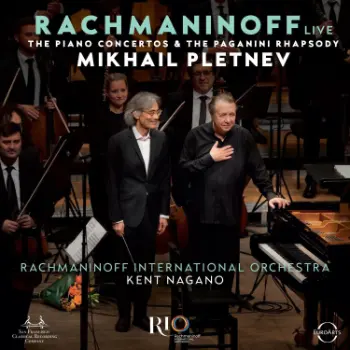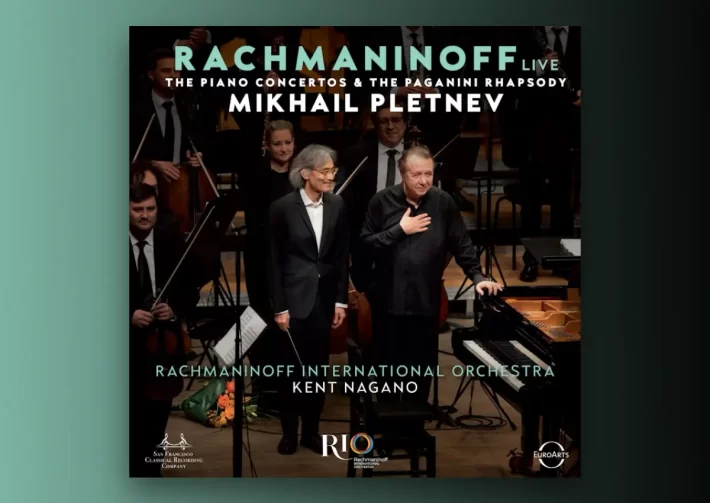In 2023, to mark the 150th anniversary of Rachmaninoff’s birth, pianist Mikhail Pletnev founded the Rachmaninoff International Orchestra (RIO). This new ensemble’s inaugural concert, conducted by Kent Nagano, featured all four of Rachmaninoff’s piano concertos and the Rhapsody on a Theme of Paganini, performed live on a single night.

Check offers of this album on Amazon.
Pletnev has recorded No. 1, No. 3, and the Rhapsody on prior occasions. A side-by-side listen points out some stark differences: the first thing one notices is the actual instrument — Pletnev uses his own Shigeru Kawai piano. SK is a lovely instrument, but in this case, the piano’s mellow temperament ultimately does not play well in the context of a scintillating and dramatic concerto.
Pletnev’s style of performance in live concerts has divided opinions; he sometimes looks rather apathetic to the audience and the works on the program, and his pianism in recent years became much mellower in terms of temperament, tempo choices and sound production. The glittering and unabashedly thunderous character of the 1987 version of the F# Minor concerto is missing: the first movement (track 8) takes a much slower tempo that proves a considerable hindrance. The opening cadenza fails to gather necessary speed; the orchestra offers some lovely color shifts and phrasing but sounds somewhat weary. Perhaps the biggest concern are the erratic (and over-present) ritards which take a frustrating toll on the music. The personality of this concerto thrives on its virtuosity and Pletnev certainly has the technique—but what comes across is not acrobatic agility so much as measured caution, which robs movements like the Allegro Vivace (track 3) of its indomitable scherzando spirit.
The opening chords of the C minor concerto (No. 2) should build suspense and tension that catapults the listener into the rest of the Moderato (track 1). Here, I was left nonplussed with Pletnev’s anticlimactic approach: there’s little buildup to speak of, and the whole segment feels rushed. The orchestra maintains the lovely, long lines of the following section well, only to be hampered by sound balance issues (namely, an oddly muted piano part even with volume on full blast). One wonders if the audience heard anything from the piano while sitting in the hall. The lyrical moments do show Pletnev’s contemplative touch and offer a nice perspective in the second theme (2’22”). One thing listeners may notice throughout, though, is inconsistency in communication and a resulting audible misalignment of parts.
The slow movement (track 2) shows the two forces making deliberate and better attempts to synchronize. Pletnev also brings out some interesting secondary lines in the piano’s ostinatos. The finale (track 3) is a little slow on the uptake, but the buildup of momentum in the latter half is solid and helps feed energy through to the end. All things considered, though, other recordings from Krystian Zimmerman/Seiji Ozawa, Vladimir Ashkenazy/André Previn, Howard Shelley/Bryden Thomson, or Leif Ove Andsnes/Antonio Pappano serve as better reference points.
Although I had hopes for the third piano concerto, misalignment and balance woes present themselves from the outset. A root cause seems to be Pletnev’s articulation: in many places, it is muddled with pedal and rises barely above a mumble. The orchestra has its beautiful moments but alas, they’re not enough to counterbalance a sluggish feel. Those looking for a more engaging account should turn to Yuja Wang’s recent performance (reviewed here) or the Horowitz/Ormandy account, where the orchestral layers have wonderful clarity and the pianist’s articulation has a special sprightliness to it.
As for the Intermezzo, it finally offers promise in terms of a long-awaited sound that is rich and present; however, the cut Pletnev makes shortly before the 5-minute mark removes almost a minute of music that is better left alone. The Finale is probably the best movement and the brass section, in particular, has a strong presence in critical moments.
Concerto No. 4 and the Rhapsody don’t deviate much from what was observed already, though the latter is better in terms of vitality, and the D-flat Variation (No. 18) doesn’t disappoint.
Completing a demanding cycle like Rachmaninoff’s concertos in a single live performance is certainly to be lauded, but the performances here don’t match the effort, certainly when other full cycles are readily available. For a more satisfactory experience by a single pianist in a live recording, Wang is the obvious choice.

Rachmaninoff Piano Concertos – Recommended Comparisons
Wang | Ashkenazy | Zimerman | Andsnes | Rachmaninoff
Rachmaninoff – Piano Concertos, Rhapsody on a Theme of Paganini
Mikhail Pletnev – Piano
Rachmaninoff International Orchestra
Kent Nagano – Conductor

Check offers of this album on Amazon.
Album Details |
|
|---|---|
| Album name | Rachmaninoff – The Piano Concertos & The Paganini Rhapsody |
| Label | Euroarts |
| Catalogue No. | B0CXS1H986 |
| Amazon Music link | Stream here |
| Apple Music link | Stream here |

















